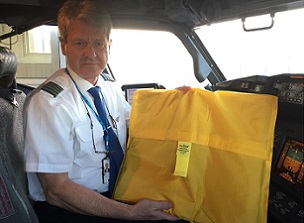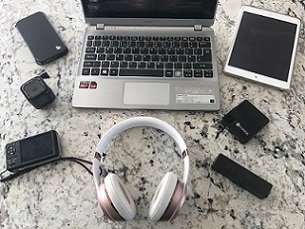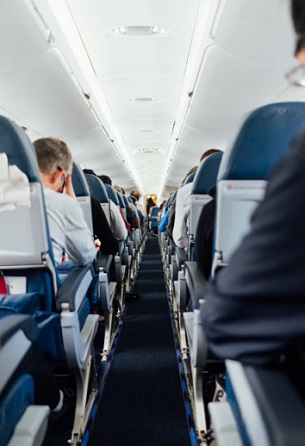 A pilot with an AvSax lithium battery fire containment bag
A pilot with an AvSax lithium battery fire containment bag
 All these personal electronic devices are powered by lithium batteries
All these personal electronic devices are powered by lithium batteries
 The last place you want a fire is in the confined space of a passenger aircraft cabin
The last place you want a fire is in the confined space of a passenger aircraft cabin
Lithium batteries could be to blame for a fire scare on a passenger plane that led it to make an emergency landing.
The plane was flying in China from Guangzhou to Yichang with 105 people on board when the crew were alerted by a cargo smoke indication.
They immediately diverted to Changsha and landed 30 minutes later with the passengers quickly evacuated from the plane on emergency slides.
The plane remained on the ground for several hours and a replacement plane meant the passengers eventually reached their original destination of Yichang.
The Aviation Herald reported: “China’s Civil Aviation Authority reported three pieces of luggage showed burn marks. The CAA does not rule out there were illegal items (batteries) in the luggage.”
Lithium-ion batteries are used to power all personal electronic devices such as mobile phones and laptops so hundreds are carried on board every flight by passengers.
Lithium-ion batteries are classed as dangerous goods when it comes to transporting them by air as there is a danger they could catch fire and, if they do, they burn at incredibly high temperatures.
When they catch fire they go into what’s known as thermal runaway. This happens when one cell overheating in a battery can produce enough heat – up to 900°C (1652°F) – to cause adjacent cells to overheat. This can cause a lithium battery fire to flare repeatedly.
They cannot be shipped in the cargo holds of passenger aircraft as automatic fire suppression systems are simply not designed to deal with such a fierce blaze at scorching temperatures.
It means passengers should always pack devices powered by lithium-ion batteries in bags they take into the aircraft cabin so if there is a problem during the flight the crew is trained to deal with it.
Airlines now publish strict rules for transporting lithium-ion batteries on their websites and the responsibility is on passengers to always check them before travelling.
The Federal Aviation Administration (FAA) states: “The U.S. Department of Transportation (DOT) supports the International Civil Aviation Organisation Council’s decision to prohibit the carriage of lithium-ion batteries as cargo aboard passenger aircraft until safer methods of transport are developed. The DOT and the FAA agree this is a necessary action to protect passengers, crews and aircraft from the risk to aviation safety. In addition, the FAA recommends that passengers safely pack their spare lithium batteries in their carry-on bags.”
Many airlines now have the world’s best-selling lithium battery fire containment bag for personal electronic devices on aircraft. The UK invention is called AvSax and they are now on more than 15,373 aircraft operated by 80 airline companies.
AvSax thermal containment bags have been used 33 times on aircraft to deal with emergencies worldwide since the start of 2017 and every time they have been deployed the aircraft has been able to complete its journey safely with no need to divert or make an emergency landing. Diversions can be very costly to the airline company and can even run into hundreds of thousands of pounds.
AvSax, which are also known in the industry as burnbags, firebags or thermal containment bags, were invented in the UK by Yorkshire company Environmental Defence Systems Ltd.
AvSax won the prestigious Queen’s Award for Enterprise in the UK in 2018, the top award any business can achieve.